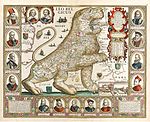
Back Gallia Belgica Afrikaans بلجيكا الغالية Arabic Белгіка Byelorussian Бэльгіка BE-X-OLD Галия Белгика Bulgarian Belgica Breton Gàl·lia Belga Catalan Gallia Belgica Czech Gallia Belgica Welsh Gallia Belgica Danish
| Belgic Gaul | |
|---|---|
| Province of the Roman Empire | |
| 22 BC–5th century | |
 | |
| Capital | Durocortorum (Reims) Augusta Treverorum (Trier) |
| Historical era | Antiquity |
• Established after the Gallic Wars | 22 BC |
• Ended with Frankish Kingdoms | 5th century |
Gallia Belgica ("Belgic Gaul") was a province of the Roman Empire located in the north-eastern part of Roman Gaul, in what is today primarily northern France, Belgium, and Luxembourg, along with parts of the Netherlands and Germany.
Before the Roman province came into existence in about 50 BC, the region was conquered by Julius Caesar during his Gallic Wars. His report, the Commentarii de Bello Gallico, described Belgic Gaul as one of the three parts of Gaul (Tres Galliæ), the other two being Gallia Aquitania and Gallia Lugdunensis. Belgica stretched from the Marne and Seine rivers, which Caesar described as a cultural boundary between the Belgae and the Celtic Gauls. In the north and east it stretched all the way to the Rhine.[1] The official Roman province of this name was later created by emperor Augustus in 22 BC, and named after the Belgae, as the largest tribal confederation in the area. However, it also included the territories of the Treveri, Mediomatrici, Leuci, Sequani, and others who Caesar did not explictly designate as Belgic.
The province was re-organised several times, first increased and later decreased in size. Diocletian brought the northeastern Civitas Tungrorum into Germania Inferior, joining the Rhineland colonies. The remaining part of Gallia Belgica was divided into Belgica Prima (in the eastern area of the Treveri, Mediomatrici and Leuci, around Luxembourg and the Ardennes), and Belgica Secunda (between the English Channel and the upper Meuse).
The capital of Belgica Prima, Trier, became an important late western Roman capital.[2]
| History of Belgium |
|---|
 |
|
Timeline • Military • Jewish history • LGBT |
| History of Luxembourg |
|---|
 |
|
|
- ^ Gaius Julius Caesar. The Conquest of Gaul. Trans. S. A. Handford (New York: Penguin, 1982), 1.1.1: "Gallos ab Aquitanis Garumna flumen, a Belgis Matrona et Sequana diuidit."
- ^ Gallia Belgica by Edith Mary Wightman. Books.google.be. Retrieved on 2013-09-07.